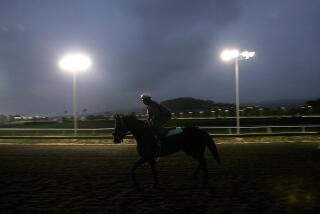A Horse Trainer Crosses Over
David Cross, who saddled Sunnyâs Halo, the Kentucky Derby winner in 1983, is leaving the thoroughbred business to train quarter horses.
Cross has claimed or bought nine quarter horses and plans to run them when the Bay Meadows season opens Feb. 21.
Since the retirement of Sunnyâs Halo to stud at the end of â83, Cross has had difficulty establishing a quality public stable in California. He once went five months without a winner and had only a handful of winners in â84.
âIâve been connected with good owners, but they donât have the kind of money it takes for a trainer to compete at Santa Anita and Hollywood Park,â Cross said. âLast year, I received 10 yearlings that cost about $105,000. Wayne Lukas has stable ponies that cost that much.â
Lukas, whose stable earned a record $5.8 million in purses last year, was a leading quarter-horse trainer who switched to thoroughbreds in 1978 and became an instant success. It is unusual, however, for a trainer to attempt the opposite transition.
âIâve gotten stale. Iâve gone sour,â Cross said. âIâm never going to get another Sunnyâs Halo, and it gets depressing to look down your shed row and look at the faces of horses whoâll have a tough time winning on this circuit. Woody Stephens can look down his shed row and see half a dozen or more horses that have Derby potential.â
After the Kentucky Derby, Sunnyâs Halo won only one more race, the Super Derby at Louisiana Downs. Cross gave up all but a few of his horses in â83 to concentrate on Sunnyâs Halo, who accounted for four of only five wins by the Cross barn that year.
Cross, 50, had recommended the mating of Halo and the mare Mostly Sunny that resulted in Sunnyâs Halo, and the coltâs owner-breeder, David Foster of Toronto, gave Cross four lifetime breeding shares in Sunnyâs Halo when he was retired. Cross sold two of the shares and kept the other two, an arrangement that has resulted in earnings close to $1 million.
âItâs given me financial security, which is one of the reasons I can make this move now,â Cross said. âThese quarter horses are my horses. They represent my money. Iâm excited about getting into this. Itâs a new challenge.â
Cross, a former jockey, got too heavy to ride thoroughbreds in the early 1950s and switched to quarter-horse riding for about a year in the Southwest.
âBut that doesnât mean that I wonât have to learn about quarter horses,â he said. âTraining âem is different than riding âem. But Iâm thinking big. Iâd like to win the All-American Futurity some day. No trainerâs ever won the Kentucky Derby and the All-American.â
The All-American, a $2.5-million race run at Ruidoso Downs in New Mexico, is the most important race for quarter horses.
Crossâ new quarter horses, however, are well below All-American caliber.
âAlready Iâve had a rude awakening in this game,â he said. âI claimed four horses out of races at Los Alamitos and found out that two of âem couldnât walk.â
More to Read
Go beyond the scoreboard
Get the latest on L.A.'s teams in the daily Sports Report newsletter.
You may occasionally receive promotional content from the Los Angeles Times.










